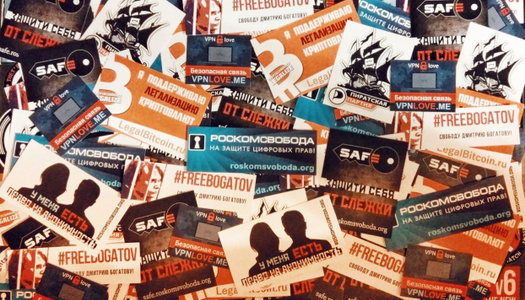
‘In a perfect world, we just wouldn’t exist’ How Roskomsvoboda became the primary force standing between the Russian government and Internet censorship
Мы рассказываем честно не только про войну. Скачайте приложение.
In the last seven years, the Russian government has drastically tightened its regulation of the Internet, and it has shown no signs of slowing down: on April 16, 2019, the State Duma passed a new law enabling the isolation of the Russian segment of the Internet from the World Wide Web. Opposition to the government’s onslaught of new laws has come primarily from small organizations and individual activists, and Roskomsvoboda has emerged as the most prominent group among them. The small-scale project, which was founded in 2012 by activists from the Pirate Party of Russia, has transformed itself alongside the growth of Russian censorship into a full-blown advocacy group. Now, Roskomsvoboda fights to unblock websites, soften the language of new bills, and beat back criminal cases against Web users. Meduza special correspondent Pavel Merzlikin took a look at how Roskomsvoboda is structured and asked whether the organization has a chance against the Russian government in the struggle for a free Internet.
In 2012, Vladimir Putin returned to his position as the president of Russia. In the same year, Pussy Riot performed its “Punk Prayer” in central Moscow’s Cathedral of Christ the Savior and ultimately received prison sentences in return. A mass pro-democracy protest movement ended in criminal charges against dozens of people, and the government took its first steps toward strict, totalizing regulation of the Russian segment of the Internet: in July of that year, a new law passed that allowed for extrajudicial bans on websites with information that might be harmful to children. State Duma members argued that the law was necessary to combat child pornography and the drug trade, but representatives from Wikipedia and the social media site VKontakte were certain that the law would lead to censorship.
And so it did. Lawmakers went on to broaden the range of prohibited content that could cause a website to be blocked. For example, in 2013, extrajudicial orders were issued blocking websites that called their users to participate in protests that had not been approved by local authorities.
The responsibility for carrying out these new regulations went to Roskomnadzor, an agency that had previously dealt primarily with issuing media licenses. On November 1, 2012, the agency released a new registry of banned websites. That same day, a new, small-scale project appeared in Moscow under a name that clearly parodied Roskomnadzor’s — Roskomsvoboda, where “svoboda” means “freedom” in Russian. The project’s website included a handy list of all the online resources blocked in Russia, instructions on how to get around online bans, and news about the country’s Internet regulation. The activists who created Roskomsvoboda belonged to the Pirate Party, which was not officially registered in Russia.
Six and a half years later, Roskomnadzor has blocked more than 275,000 resources, no one blinks an eye anymore at criminal cases triggered by comments and reposts, and the government has passed a string of new laws that place strict regulations on the Internet. Those laws have enabled Russian citizens to request that search engines remove certain links from their results and mandated that Internet service providers and operators preserve a record of their users’ activity for up to half a year. Most recently, they have also penalized online expressions of “disrespect toward the government” and allowed for the isolation of the RuNet. Roskomsvoboda developed alongside the regulations it hoped to combat. By 2019, it had grown from a small website to the primary source of advocacy for a free Internet in Russia.
No, not that kind of pirate
In 2009, Moscow State computational math and cybernetics grad Stanislav Shakirov visited one of his former classmates in Germany and discovered that his host was a member of the local Pirate Party. The party was founded in 2006 and has since advocated for online freedoms, copyright reforms, and direct electronic democracy. The Pirate Party is officially registered in Germany, and by the time Shakirov found out about it, the group had already attracted a following. In 2009, the ‘pirates’ won 2 percent of the vote for the Bundestag.
Shakirov had always been interested in the intersection between technology and politics, so he quickly became fascinated with the Pirate Party’s ideas. When he returned from Munich to Moscow, he began searching for a local branch but quickly found that the Pirate Party’s presence in Russia was limited to an online forum. Shakirov decided to take the situation into his own hands, and he organized the first offline meeting for the party’s Russian activists. In December of 2009, the party had already held its first online elections, and Shakirov became the organization’s chair.
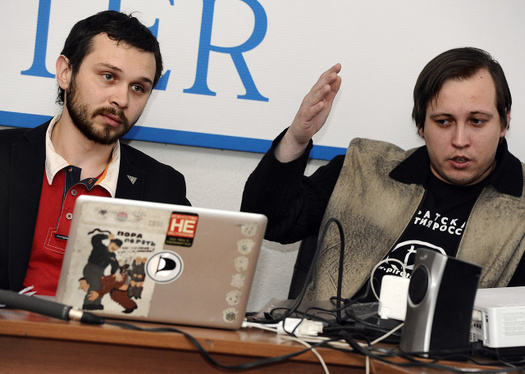
The Russian ‘pirates’ dreamed of becoming a real political force, ultimately competing for power and even the president’s seat. They took part in regional elections, either as independent candidates or on other parties’ lists. One Pirate Party member tried to get elected to the short-lived Coordination Council of Russian opposition activists in 2012. All of those efforts were in vain.
The ‘pirates’ tried to register their party officially several times, but the Justice Ministry refused for a variety of reasons, including the fact that the party’s name mentions pirates, while its political goals have nothing to do with maritime thievery and therefore “do not correspond to the party’s title.”
In recent years, Russia’s Pirate Party has stopped seeking official recognition. Its current chair, an IT manager from Arkhangelsk named Anton Yershov, told Meduza that the organization now includes several hundred people, though only about 100 participate in it actively. They share cases of Internet censorship in social media groups, make podcasts, and sometimes even organize public demonstrations. The Pirate Party was among the organizers of the “For a Free Internet” protests after the social app Telegram was blocked in Russia a year ago. The Russian ‘pirates’ also stay connected with their counterparts in other countries, where the party’s status tends to be far more stable. For example, the ‘pirates’ count among their number both the mayor of Prague, Zdeněk Hřib, and current European Parliament member Julia Reda of Germany. In some countries, Iceland and the Czech Republic among them, the party holds parliamentary seats.
In Russia, the party’s successes have been more modest, and after the government’s initial refusal to grant its requests for official registration, some members’ “enthusiasm faded,” the remaining ‘pirates’ admit. However, in 2012, five of the party’s activists released Roskomsvoboda, and at first, the project was an explicit part of the party. Four of those members still devote most of their waking hours to Roskomsvoboda. They are press secretary Natalya Malysheva along with group leaders Stanislav Shakirov, Sarkis Darbinyan, and Artyom Kozlyuk. Kozlyuk is formally listed as the group’s chair, but the activists insist that they have a “three-pronged” leadership.
All four Roskomsvoboda veterans met each other in the Pirate Party. All four of them were interested in technology, but their backgrounds varied widely. Malysheva was trained as a journalist, Darbinyan was a practicing attorney, and Shakirov owned his own small IT business. Kozlyuk devoted seven years of his life to the military: he trained as an engineer in a military college and then served in the army, ultimately receiving the rank of senior lieutenant. Kozlyuk joined the Pirate Party in early 2010.
“I was a civil activist even before the party,” Kozlyuk explained. “I was always trying to make the bureaucrats work. I just showed up as a physical presence at the administration and asked for things like repairing the road outside my house. And I managed to get them to do it. So as an organization that defends digital rights, the Pirate Party was a logical extension of what I was doing.”
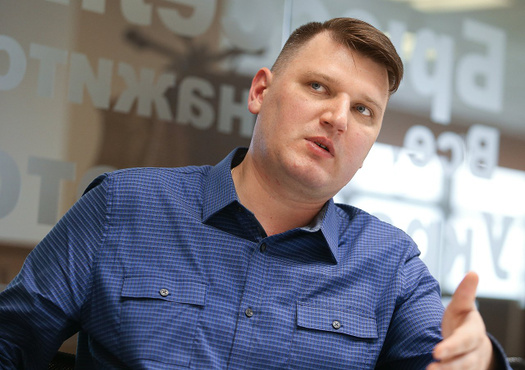
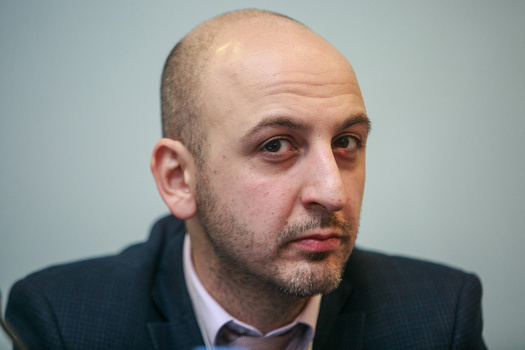
Gradually, Roskomsvoboda branched away from the ‘pirates,’ but the two organizations work together to this day. The leaders of Roskomsvoboda are still members of the party, but they don’t participate in it much anymore — there’s not enough time. “There’s already a new generation at the helm of the pirate ship,” said Roskomsvoboda’s resident lawyer Sarkis Darbinyan.
Kozlyuk clarifies that, at first, activists did not intend to turn Roskomsvoboda into an independent advocacy group separate from the Pirate Party. They just wanted to create a convenient service that would allow users to track which websites were being blocked. However, the project immediately attracted attention from both users and journalists, and in 2013, the government continued to approve new laws that limited online freedom in Russia. At that point, the founders of Roskomsvoboda finally realized that what they were doing was no longer limited to a list of blocked websites.
From ‘pirates’ to human rights advocates
In 2013, the State Duma passed a law allowing the Russian government to block websites carrying pirated content without a court ruling, as a security measure to be implemented in response to complaints from rights holders. In the same year, the Russian Social Initiative (ROI) site was released to allow residents to petition government agencies with the promise that their petitions would be read if they received more than 100,000 signatures. Roskomsvoboda, which had been in existence for less than a year, decided to investigate the ROI’s effectiveness and try to put a stop to the anti-piracy law.
Artyom Kozlyuk posted a petition against the law on ROI, and it collected the requisite 100,000 signatures in the course of a month. Kozlyuk was invited to a hearing with an expert government commission. It was chaired by then-Open Government Minister Mikhail Abyzov, who has since faced charges for fraud and forming a criminal group. During the hearing, the activist called the piracy law “flawed.” “I gave a speech, but they told us that they can’t repeal a law that was just passed,” Kozlyuk said.
Despite the government board’s rejection, the petition found support among State Duma members from the Russian Communist Party. They introduced a bill repealing the law, but the proposal didn’t even make it to a first reading in the Duma. Shortly afterward, a new law was passed allowing for permanent bans on websites that are caught violating copyright several times. In late 2015, Russia’s largest torrent tracker, RuTracker.org, was added to that list. Roskomsvoboda’s lawyers tried to appeal the decision, but in early 2016, the tracker was blocked “forever.”
Roskomsvoboda still considers its first battle against the anti-piracy law to be something of a success. “We were pioneers in digital activism in Russia. We broke new ground. And we realized that there’s an enormous number of Internet users who support this and see us as experts in this field. That pushed us to expand our activities,” Kozlyuk said.
And that’s how Roskomsvoboda started to become an advocacy group. It began initiating social campaigns against Internet regulation and offering legal help to individual users.
Among its victories, the group lists a fight against yet another legal measure: a bill proposed by Russia’s Culture Ministry that introduced a global licensing measure popularly known as the “Internet tax.” The bill was based on a proposal by the director Nikita Mikhalov’s Russian Union of Rights Holders (RSP). Mikhalkov proposed a tax that would apply to any Internet user every time they shared content that is protected by copyright. Internet service providers would be responsible for tracking user activity, collecting taxes, and sending them to the RSP.
Roskomsvoboda came out against the law and later noticed that the bill’s public comment page on regulation.gov.ru had been attacked by bots that left exclusively positive comments about the “Internet tax.” The Ministry of Economy and Development, which runs the site, admitted that it had been attacked and deleted the bots’ comments. Ultimately, the ministry itself did not approve the idea, and the president’s administration also came out against it. Mikhalkov’s initiative was never realized. “We were some of the people who managed to kill that law. And examples like that show that government tools can work on the federal level too, at least sometimes,” Kozlyuk said.
In Roskomsvoboda’s next six years of operation, the organization managed to challenge bans against a range of websites and interfere with several criminal cases for online reposts. They also softened newly proposed bills and took part in a broader social campaign that the organization believes led to the partial decriminalization of the “anti-extremist” article 282 of Russia’s Criminal Codex. “We worked on that for at least three years,” Sarkis Darbinyan told Meduza. “We wrote to prosecutors and to the Supreme Court, and we compiled statistics and analysis to show how absurd these cases were, and so on.”
#freeBogatov
The case against the mathematician Dmitry Bogatov occupies a special place in the short history of Roskomsvoboda’s advocacy. Bokatov’s has been one of the most widely resonant terrorism cases in Russia. In April of 2017, the mathematician was accused of encouraging terrorism and mass disorder through extremist comments he made in a forum for system administrators. The prosecution built its case on the assertion that the comments were made from an IP address that matched that of Bogatov’s computer. The mathematician himself denied the charges against him and explained that an output node for the anonymous network Tor was located on his computer, enabling other users to share his IP address.
Nonetheless, Bogatov was jailed, and investigators insisted that he was guilty. At that point in the case, Sarkis Darbinyan joined the mathematician’s defense, and Roskomsvoboda worked with other social advocates to create the hashtag #freeBogatov. A few months later, Bogatov was released. The charges against him were dropped, but the case itself was not, and it was used instead to charge the Stavropol programmer Vladislav Kuleshov, who confessed that he was guilty.
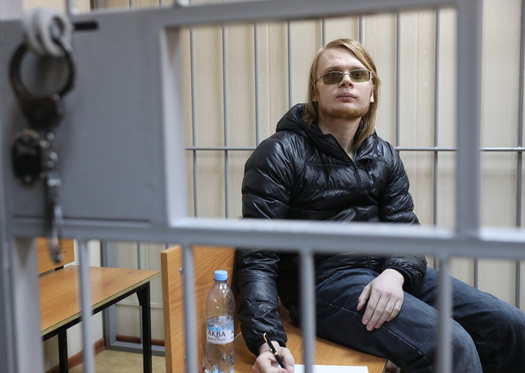
In spite of its individual victories, Roskomsvoboda admits that it is not yet powerful enough to stop Russia’s general movement toward strict Internet regulation: the organization’s public campaigns were unable to stop the user data storage law, the Telegram ban, or the Internet isolation bill. Nonetheless, the activists say that cases like Bogatov’s acquittal have made them continue their work. “Unfortunately, it’s difficult to achieve any real success in our political climate,” Artyom Kozlyuk said. “Maybe if there weren’t any victories at all, we would start losing hope. But we see that our work is useful.”
How Roskomsvoboda stays afloat
Roskomsvoboda remains a very small organization. According to Artyom Kozlyuk, there are only about 10 people who work on it full-time. Apart from the three leaders, they include lawyers, web editors, the press secretary, a programmer, and a system administrator. The project also gets help from volunteers. Stanislav Shakirov, the project’s technical director, explained that Roskomsvoboda includes people aged 25 to 40 who work in a wide range of professions, from programming to translation to design. The only thing that unites them is a belief in online freedom.
Together, they follow cases through Russian courts and keep track of government purchases related to Internet regulation. They lead public campaigns, defend Internet users in court, and write news and analysis pieces on Internet regulation. At the same time, the majority of the team’s full-time members also run their own business or work another job. Only a couple of them rely on Roskomsvoboda as their sole employer and source of income. The organizations simply can’t offer its employees a high salary because its monthly budget is currently limited to around 250,000 rubles ($3,910).
Roskomsvoboda is not officially registered. Its full-time employees are officially considered staff members at the Foundation for the Development of Digital rights, which Pirate Party activists created way back in 2010. The head of the foundation, Natalya Malysheva, who is also Roskomsvoboda’s press secretary, told Meduza that at first, activists planned to use the foundation to create educational materials, but that project fell by the wayside. Ultimately, the Foundation got a makeover, and it now serves as a financing mechanism for Roskomsvoboda.
Malysheva said that between 2012 and 2016, Roskomsvoboda’s foundation received three government grants from the Civil Virtue movement, and those funds made up a significant portion of the organization’s budget. Then, the government stopped giving money to Roskomsvoboda — the group still regularly applies for grants, but its requests are consistently rejected. Its members have not received an explanation for those rejections.
After it lost access to government grants, Roskomsvoboda relied for several years on private donations, fundraisers for specific projects, and salaried research work on Internet regulation that employees completed for other human rights activists. Roskomsvoboda has never applied for grants internationally for fear that such a move would trigger persecution on the part of the Russian government.
The organization works constantly to attempt to expand its budget. In early 2019, Roskomsvoboda received a grant from Dialog, Alexey Kudrin’s foundation for the development of civil initiatives. The organization cannot discuss the details of the grant due to the conditions of the award. Roskomsvoboda has also turned to crowdfunding. Kozlyuk said that the group hopes regular payments from users will bring in more than 500,000 rubles ($7,820) monthly. They currently provide about 50,000 – 60,000 rubles ($782 - $938).
The group also gets help thanks to one of its organizers’ side projects, the Center for Digital Rights. The center also provides legal help in cases related to technology and the Internet, but not for free. At first, the center was part of Roskomsvoboda, but it later split off into a separate for-profit project. “Every case that comes to Roskomsvoboda’s attention gets sent to the center. Over there, we still deal with digital rights cases, but they’re cases that don’t carry a clear public interest. It’s a commercial situation,” said Sarkis Darbinyan, who is also a partner at the Center for Digital Rights.
The center helps entrepreneurs get their websites unblocked, understand Internet-related regulatory law in various countries, and get reliable consulting on legal questions related to ICO, a method of initiating investment for cryptocurrency ventures. Darbinyan emphasized that these services have seen an increase in market demand. The center currently employs eight attorneys.
Some of the center’s profits go to Roskomsvoboda, said Natalya Malysheva, who serves as the press secretary for both organizations. The center’s lawyers also work on pro bono cases run out of Roskomsvoboda. For example, they defended the owners of cryptocurrency-related websites that Roskomnadzor blocked at the request of the St. Petersburg prosecutor’s office. Ultimately, St. Petersburg’s City Court ruled that move to be illegal, and in late 2018, the court demanded that prosecutors pay 150,000 rubles ($2,346) to the owner of one of the websites in question.
Another small source of income for Roskomsvoboda is the VPNlove project. It’s a list of paid VPN services that, according to the organizers’ investigations, do not cooperate with Roskomnadzor and do not use user data to their own advantage. The project gives users the option of connecting to one of the verified VPN services, and Roskomsvoboda receives a portion of the resulting profits. However, the group’s representatives emphasized that finances play no role in their decision to include or exclude services from their list.
In combination, these income sources are still not enough to allow Roskomsvoboda to grow actively. “We get by somehow, but we could do more. We have a lot of ideas that we could definitely bring into action,” Kozlyuk said.
An age of irrational laws
Early on, Roskomsvoboda actively used government services like ROI and made clear on numerous occasions that it did not intend to resist the government as a whole — only its regulation of the Internet. “In our analytical texts, we try not to act like boggers who are trying to overthrow someone or something like that. We try to express our ideas in a more restrained way, like a good media outlet,” Kozlyuk explained. Nonetheless, there have been several attempts to place limits on the group’s activity.
In February of 2016, Roskomnadzor put Roskomsvoboda on its registry of banned websites. That move was a result of a decision by Anapa’s City Court, which ruled in April of 2015 that the project’s page on circumventing website bans broke Russian law. Roskomsvoboda tried to appeal the ruling but was unsuccessful.
Ultimately, the group managed to avoid being blocked. Roskomsvoboda sent a request to the Communication Ministry and received an official response stating that the information on the website was legal. The document included explanations about the functioning of VPNs and Tor. In fact, the text essentially duplicated the one the Anapa court had found to be illegal. In the end, Roskomsvoboda simply replaced its own page with the ministry’s official document. That route satisfied Roskomnadzor, and it deleted the organization’s website from its registry. Roskomsvoboda’s complaints against the Anapa City Court have now made their way to the European Court of Human Rights, where the activists intend to demonstrate that the local court’s order was illegal.
Access to Roskomsvoboda’s website is also limited in Moscow’s educational institutions, especially schools and undergraduate colleges. The organization discovered that fact in 2016 when its own users tried to access the list of blocked websites through their institution’s network. They got a message stating that access to the site was locked because it had ties to terrorism and extremism. The message did not specify the nature of those ties. By then, the site was absent from Roskomnadzor’s blacklist: online safety filters for educational institutions were produced by a for-profit company called Bezopasny Internet (Safe Internet). The company was part of the portfolio controlled by the Russian Venture Company Seed Fund, and it was created by former programmers for the media outlet Rambler. Roskomsvoboda has attempted to challenge the company’s decision to block it in court, but it has been unsuccessful so far.
Kozlyuk also emphasized that Roskomsvoboda is not currently experiencing any serious government pressure and that the group is still willing to work with state agencies. For example, the organization would be willing to help Roskomnadzor communicate with the websites it blocks. It tried out that role in August of 2015, when Roskomnadzor blocked Wikipedia in Russia for several hours in response to an article about the cannabis drug Charas. Roskomnadzor ultimately backed down.
“It’s possible that we’re just too small for the government to put pressure on us,” Artyom Kozlyuk suggested. “At the same time, we have a permanent conversation going with high-level officials, and I know they read our content. On top of that, they share a lot of our ideas, but they can’t support us publicly because they’re at such a high level. Of course, ideally, we would want all these laws to be repealed, but we don’t go up to them and say that all their work is bullshit. We make specific proposals, and they often agree with us, but then it all goes nowhere.”
Former Deputy Communications Minister Ilya Massukh and Leonid Levin, who leads the State Duma’s communications and technology committee, confirmed to Meduza that Russian government officials pay close attention to Roskomsvoboda’s activities. Levin knows Kozlyuk personally because, despite their disparate views about online rights, they are both members of the Regional Social Center for Internet Technologies (ROTsIT). “You can’t always agree with Roskomsvoboda’s opinions — far from it — but it’s certainly necessary to listen and hear them out,” Levin told Meduza.
All Russian officials who work with the Internet know about Roskomsvoboda and its support for a maximally free online space, and they take the organization’s views into account for reasons quite distant from their “youthful maximalism,” as Russian Internet ombudsman Dmitry Marinichev put it. “People absolutely read them and accept what they write on an individual, private level because they do a very professional job of finding problems in government initiatives and bills,” the ombudsman said. “But in terms of collective reactions, I wouldn’t say there’s a trend toward officials following common sense. It’s just that we’re going through a historical era that distorts the situation: the government can sometimes bend society toward accepting laws that the government itself believes are irrational.”
Sergey Plugotarenko is the director of the Russian Association for Electronic Communication, which lobbies for Internet companies like the Mail.Ru Group in the Russian government. Plugotarenko believes that even organizations that are more formalized than Roskomsvoboda — professional IT associations, for example — can face difficulties in getting government officials to hear them out.
Irina Levova, who curates the Communications and Information Technologies workgroup for the Russian government, spoke to Meduza about a similar problem. Levova, whose group also includes Artyom Kozlyuk, said that government officials do take expert opinions into account, but only when no preexisting political decision has been made about the laws in question. For example, Levova’s workgroup released a negative report on the bill isolating Russia’s Internet, but the proposal passed the State Duma anyway. “Our reports are recommendations,” Levova explained. “Our motto is ‘do what you should, and what will be will be.’”
Artyom Kozlyuk believes that social activists are also unable to change the government’s course because the biggest players in the online market, such as Yandex or Mail.Ru, don’t take a tough enough position on these questions. “We really need more people like [Pavel] Durov to openly oppose [government decisions] or even encourage people to protest,” Kozlyuk said. Representatives of Yandex and the Mail.Ru Group did not respond to Meduza’s questions about Roskomsvoboda and their own resistance to Internet regulation.
Leonid Volkov, an associate of opposition politician Alexey Navalny and the co-founder of the Internet Protection Society, told Meduza that only regime change could alter the situation surrounding Internet regulation in Russia. “I really admire the folks from Roskomsvoboda, but we do disagree on this matter. I think our bureaucrats know all of it, understand all of it, and bringing information to their attention isn’t the problem anymore. They just understand that the Internet could be used to beat them.”

Roskomsvoboda’s members insist that they do not aim to become a political organization, though Artyom Kozlyuk gave speeches during Russia’s protests for Internet freedom in 2017 and 2018. “We’re a social organization, but in Russia, people always try to tie social activism to political activism. We don’t want to cozy up with some kind of political force. If United Russia happened to propose a useful Internet bill, we’d support it,” Kozlyuk said. Roskomsvoboda’s leader added that he is not willing to run for a Duma seat under one of the parliament’s current political parties but that he might do so if the Pirate Party were able to register officially.
* * *
On April 16, 2019, the State Duma approved its bill on Internet isolation in the proposal’s third and final reading. The bill allows the Russian government to control the nodes that connect Russia’s segment of the Internet with the rest of the Web and turn off that connection should significant threats arise. Leonid Levin, the head of the Duma’s communications committee, made clear during parliamentary debates about the bill that disconnecting the RuNet from the World Wide Web could cost the Russian economy 20 billion rubles (more than $313 million) per day. The government estimated that implementing the law would cost approximately 30 billion rubles (almost $470 million).
The fight against the law has become one of Roskomsvoboda’s primary lines of work. Just before the bill passed, the group released the Digital Defense project, which enabled users to send messages to State Duma deputies expressing their opposition to the bill. Otherwise, the website claimed, Russian life will soon reflect “dystopias like Orwell’s or Bradbury’s.”
Artyom Kozlyuk emphasized that activists knew the law would pass. Moreover, Roskomsvoboda believes that the government will continue its struggle against the Internet in the near future by taking steps like punishing attempts to access blocked information (in other words, for using VPNs or Tor). In turn, the activists have no plans to abandon their own work.
“What our organization does is necessary under this kind of government pressure. In a perfect world, we just wouldn’t exist. But right now, I’m convinced that if not for our work and the work other activists are doing, Internet regulation would be advancing even faster. And it’s possible that there would be even more of these laws,” Kozlyuk argued.
Stanislav Shakirov agreed: “Nothing lasts forever, and the crap that’s going on right now with the Internet will end sooner or later. They might even water down this Internet sovereignty law. I mean this with a good dose of irony, but I hope that in this case, Russian corruption will win out, and the law won’t work. After all, corruption is better than a sovereign Internet.”
Translation by Hilah Kohen